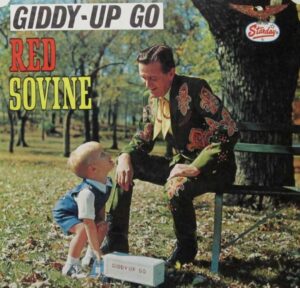If one is to look at the television, it seems murder is all the rage these days. You have a choice of “NCIS (insert your city here)” — and little else.
Television networks are systematically wiping out cities to the tune of a dozen or more murders a week. Take “Longmire,” for instance. Over 63 episodes, the producers killed off half the population of Wyoming.
But crime and murder are nothing new.
I once read that Chuck Conners killed 241 men over the course of the “The Rifleman” series in the 1950s and 1960s. All the while, he had fireside chats with his son and reminded him that killing a man is not a decision to take lightly.
Ahh, for the gentle days of the Old West, when Pa always knew what was best.
Well thinking along those lines, country music is a microcosm of America. It’s really no surprise that in the 100 or so years of country songs, more than just a handful have focused on murder or its aftermath.
And of those songs, no tune spoke more blatantly of murder than The Louvin Brothers’ 1959 hit, “Knoxville Girl.”
Ira and Charlie Louvin (aka Loudermilk) arrived on the music scene in 1940 as gospel performers. Singing in a bluegrass style, Ira played the mandolin, and Charlie rhythm guitar. It was the well-tuned harmonies of their music that made the duo famed singers of early country music.
But despite their gospel beginnings, the Louvin Brothers — particularly Ira — didn’t learn from the songs they were singing.
Ira Louvin was a drunk, a womanizer and a man with a violent temper. Married four times, he attempted to strangle his third wife, but she turned the tables on him. She wound up shooting him six times. When taken into custody, she famously told the police if that didn’t kill him, she’d come back and finish him off.
Ira survived, but the marriage didn’t. Ira was a classic case of a man who was fine — when he wasn’t drinking. The problem was, he was always drunk. He was known to smash his mandolin in the middle of a performance, only to be found trying to glue it back together after the show.
As for Charlie he was the opposite of his brother Ira. A foot shorter, he was the most levelheaded of the pair. In fact, he frequently chastised his brother for his various addictions and shortcomings as a husband. As it turned out, Charlie left his brother behind for a solo career in 1963.
Two years later, Ira and his fourth wife died in a car accident. At the time, a warrant was out for Ira’s arrest on a DWI charge.
Considering the tension between the two, perhaps it’s not surprising that the Louvin Brothers released the album “Tragic Songs of Life” on Capitol Records in 1956. Murder ballads were the hallmark of their debut album with Capitol, and they sang under the influence of other bluegrass musicians like Bill Monroe and The Blue Sky Boys.
One of the singles released from “Tragic Songs of Life” was “Knoxville Girl.” If the Louvin Brothers weren’t already straying from their gospel roots, “Knoxville Girl” provided a direct line toward Satan. In fact, at the time the song was released, they had already recorded another album titled “Satan is Real.” It seems those Baptist boys from Alabama had fallen for secular music — the hard way.
“Knoxville Girl” is an unusual song, not for its harmonies or bluegrass style, but for its lyrics. Until the release of this song, country music was fairly tame. No doubt, lots of love had been lost in country songs over the years, and most of it for the right reasons. But the Louvin Brothers entered a whole new — and sinister — territory with “Knoxville Girl.”
“Knoxville Girl” wasn’t exactly a new song. In fact, it originated in Ireland and was based on the story of a murder that took place in 1683. Several variations of the song had been sung as folk music over the years — but, again, none were as unapologetically violent as the Louvin Brothers release.
“Knoxville Girl” begins casually enough. The Louvin Brothers sing of courting their girl on the front porch of her Knoxville home. But before the end of the first stanza, the song takes a murderous turn: While out for an evening walk, the narrator sings, “I picked up a stick off the ground and knocked that fair girl down.” The second stanza is a description of the girl begging for her life as the narrator continues to beat her. Eventually, her blood covers the ground.
But the tortured lyrics of “Knoxville Girl” don’t stop here. In third stanza, the narrator describes how he twists the girl’s blond hair as he drags her to the river. There, he slings her body into the water while singing, “Go down, go down, my Knoxville girl. You can never be my bride.”
The narrator doesn’t have peace for long.
After lying to his mother about the source of the blood on his clothes, he experiences a miserable night. “Rolled and tumbled the whole night through, as troubles was for me. Like flames of hell around my bed and in my eyes could see.” At some point, guilt overcomes the murderer.
The lyrics suggest he confesses and is hauled to jail. No one can (or will) put up his bail. He leaves us with the words, “I’m here to waste my life away down in this dirty old jail, because I murdered that Knoxville girl, the girl I loved so well.”
While he admits to his crime, no motive is ever suggested.
Plenty of artists have sung of murder since “Knoxville Girl” was recorded. Lefty Frizzell hauntingly played the part of an innocent dead man in “Long Black Veil.” Vickie Lawrence — and eventually Reba McEntire — turned the tables and played the part of the killer in “The Night the Lights went out in Georgia.”
And, perhaps most disturbingly, The Chicks (formerly known as the Dixie Chicks) sang “Goodbye, Earl,” a statement against domestic violence told in what they believed was a humorous way in 2000. The video (I say with sarcasm) is about as funny as the hopelessly poor song. But in reality, the theme of this song is no worse than “Knoxville Girl.” Only the reputations of the artists make the difference.
Until next time, if you have the hankering for a little crime story while behind the wheel, pull up your favorite murder mystery podcast … or just play a country album. Before long, you’ll be hearing about the murders that are all the rage in American entertainment.
Since retiring from a career as an outdoor recreation professional from the State of Arkansas, Kris Rutherford has worked as a freelance writer and, with his wife, owns and publishes a small Northeast Texas newspaper, The Roxton Progress. Kris has worked as a ghostwriter and editor and has authored seven books of his own. He became interested in the trucking industry as a child in the 1970s when his family traveled the interstates twice a year between their home in Maine and their native Texas. He has been a classic country music enthusiast since the age of nine when he developed a special interest in trucking songs.









